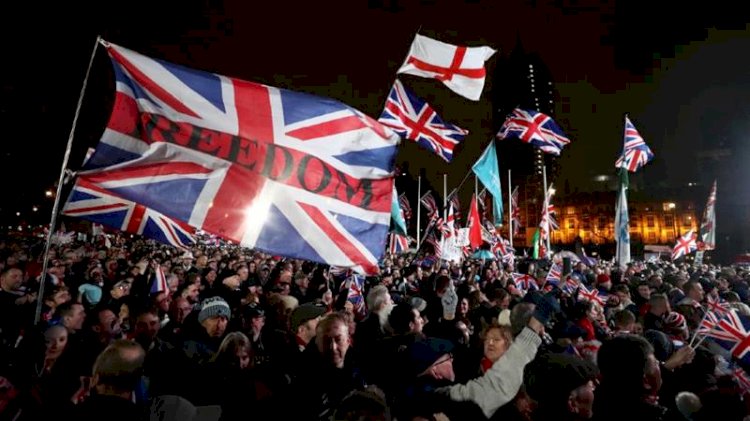Brexit: UK officially leaves the European Union

The flags outside embassies have been lowered, the countdown clocks have stopped. The United Kingdom is no longer a member of the European Union.The country's 47 years of membership officially ceased at the stroke of 23:00 GMT (midnight Brussels time), more than three and half years after an in/out referendum exposed deep rifts across British society.
UK Prime Minister Boris Johnson marked the historic moment with his team at his Downing Street office, celebrating with English sparkling wine and an array of British culinary treats.
As the clock ticked down the final seconds, thousands of Brexiters celebrated outside Parliament and groups burned EU flags on the streets of London.
Anti-Brexit campaigners mounted several protests along the Irish border.Under the terms of the withdrawal agreement between the UK and the EU, Britain now enters a transition period until the end of 2020, meaning London will abide by most EU laws while their future relationship is hashed out.
Johnson must now achieve a trade deal with the EU - the world's largest trading bloc - within 11 months, a task most experts have described as ambitious at best, but his wider mission over the next five years will be to find a way to repair the country's divisions.
The years since the referendum have seen ugly scenes at protests and clashes between pro- and anti-Europe demonstrators, as well as bitter rhetoric dominating newspapers and appearing in Parliament, and fears of a return of Northern Irish paramilitary violence.
It is not over yet
But those who think Friday's official departure date marks an end to the chaos may yet be disappointed."We are not even at the halfway point in this process," said Scott Lucas, a professor of international politics at the University of Birmingham.
"We are only going into the tough negotiations with the European Union - on the economic relationship; on the status of Northern Ireland; on industry, agriculture, banking and finance," he told Al Jazeera. "Even on basics such as will Britons have health insurance in Europe? What are the rights of EU citizens living here and of UK citizens living in Europe?"
Trade expert David Henig, the UK director of the European Centre for International Political Economy think-tank, agreed Johnson has a difficult task ahead of him.
"The UK government, having spent nearly four years deciding what it doesn't want - to be members of the EU, have now given themselves less than a year to decide what they do want - in the shape of EU and US trade deals," he told Al Jazeera. "It is a huge challenge, particularly in such a short time."
Astonishing moment of hope
Johnson himself, however, remained bullish, calling the UK's withdrawal from the EU "an astonishing moment of hope" in a televised address to the nation.
"This is the moment when the dawn breaks and the curtain goes up on a new act in our great national drama," he said."Of course, I think that is the right and healthy and democratic thing to do," he added. "Because for all its strengths and for all its admirable qualities, the EU has evolved over 50 years in a direction that no longer suits this country."
The prime minister called for "a new era of friendly cooperation between the EU and an energetic Britain".
"When I look at the potential of this country waiting to be unleashed, I know that we can turn this opportunity into a stunning success. And whatever the bumps in the road ahead, I know that we will succeed."
Boris Johnson owns Brexit
Brexit has caused the downfall of two prime ministers. David Cameron resigned after the unexpected win for the leave camp. His successor, Theresa May, was subsequently lambasted on all sides, with many who thought the withdrawal agreement her administration reached with Brussels either did not go far enough to cut ties with the EU, or did not protect British interests in the wake of the UK's departure.
Johnson had to spend the first few months of his term in office battling a pugnacious Parliament while unable to command a ruling majority. He then won a sweeping general election victory in December under the slogan: "Get Brexit done."
Mark Shanahan, head of the international politics department at the University of Reading, said doing so would be Johnson's "ultimate challenge"."Tonight the UK sets out on a journey into the unknown: zigging while the rest of the world zags," Shanahan told Al Jazeera.
"With a mix of hubris, nostalgic nationalism and cussed optimism, we set sail on a voyage with no clear ending. For the next 11 months, the UK will be the EU's rule-taker, subject to all of the same regulations, but with no vote, no voice and no veto," he said.
The UK wants a friction-free trade deal with Europe at the same time as sorting trade deals with the United States and the Commonwealth while retaining jobs, inward investment and boosting public services, he added.
"Is it possible? Yes. Is it likely? No. Something will have to give, and there will be many compromises to be made. Chutzpah and optimism will not be enough.
Now is the time to back snappy sloganising with substance. Fail, and the UK will break with the prospect of a United Ireland and independent Scotland. Boris Johnson owns Brexit. The new dawn presents his ultimate challenge."
